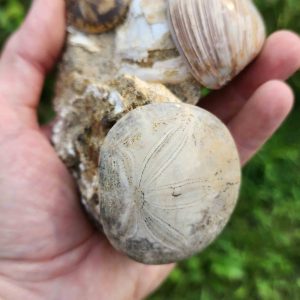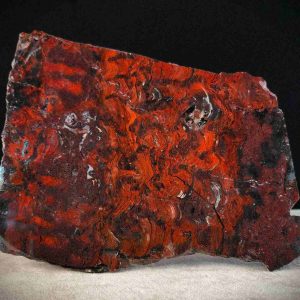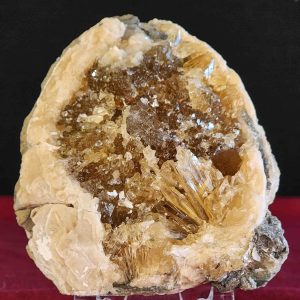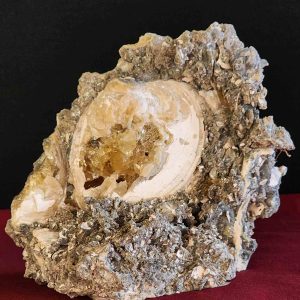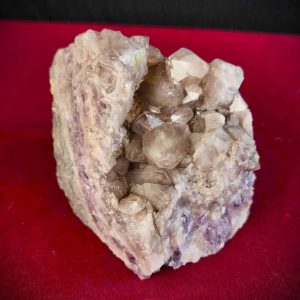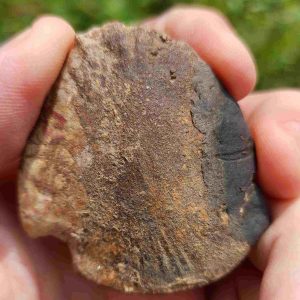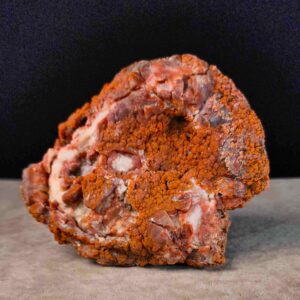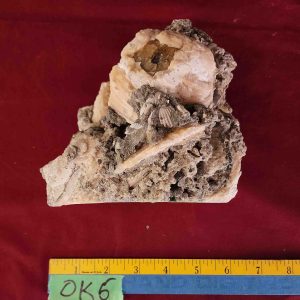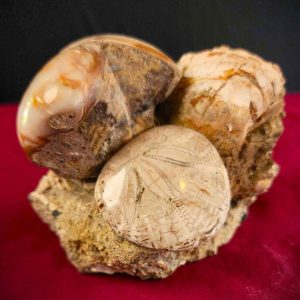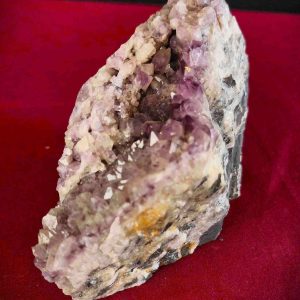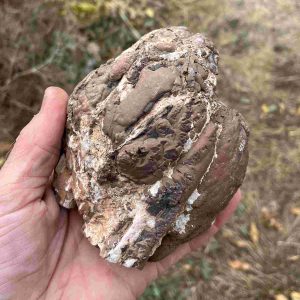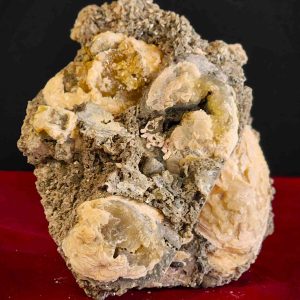- The product "Agatized Coral (AC5)" has been removed from your wishlist because it can no longer be purchased.
- Failed to add “Agatized Coral (AC5)” to your wishlist
-
Fossil Sand Dollar and Clam (KH2)
Notes specific to this specimen: Matrix piece that has a flat bottom so it stands nicely. This specimen has one large and one infant sand dollar with a nice polished clam that has great colors.
SIZE: 5″x 3″x 3″
NAME: Psuedocardium & Dendraster
AGE: Pliocene Epoch – 4 million years
UNIT: Etchegoin Formation
SITE: Kettleman Hills, California
DATE: 2023Documents: This authentic fossil specimen comes with a Certificate of Authenticity and Origin. In addition, an attractive and informative display card accompanies the specimen.
$460.00 -
Iron Stromatolites (ME4)
Notes specific to this specimen: Rare white colonies with dark banded growth rings. Some have branchings. Specimen found in 1990s at the old Mary Ellen Mine in Biwabik, Minnesota, the type locality for the Biwabik Iron Formation. Notice the silvery spots of concentrated iron between the colonies.
SIZE: 5″ x 7″ x .3″
Name: Collenia undosa
Unit: Biwabik Iron Formation
Site: Biwabik Iron Range, Minnesota
Date: Mid 1990sDocumentation: This authentic fossil specimen comes with a Certificate of Authenticity and Origin.
$450.00Iron Stromatolites (ME4)
$450.00 -
Crystalized Clam (OK1)
Notes specific to this specimen: This complete clam is packed full with honey calcite. There are some fantastic radial calcite crystals amidst a solid honey calcite matrix. The back is a partially recrystallized shell. This is a singularly unique find.
SIZE: 5″x 3″x 2″
NAME: Mercenaria permagna
AGE: Pleistocene 2 million years
UNIT: Nashua Formation
SITE: Okeechobee County, FloridaDocumentation: This authentic fossil specimen comes with a Certificate of Authenticity and Origin. In addition, an attractive and informative display card accompanies the specimen.
$440.00Crystalized Clam (OK1)
$440.00 -
Crystalized Clam (OK3)
Notes specific to this specimen: Great honey calcite crystals replacing the clam shell trapped in matrix. This piece has a sawn flat bottom so it stands up nicely on its own. Nice display specimen
SIZE: 8″x 5″x 5″
NAME: Mercenaria permagna
AGE: Pleistocene 2 million years
UNIT: Nashua Formation
SITE: Okeechobee County, FloridaDocumentation: This authentic fossil specimen comes with a Certificate of Authenticity and Origin. In addition, an attractive and informative display card accompanies the specimen.
$425.00Crystalized Clam (OK3)
$425.00 -
Cerdito Prospect Rift Crystals (CP13)
Notes specific to this specimen: Cool combination piece dominated by a cavity of nice light smokey quartz crystals encased in an amethyst vein. Note: One of the large crystals has a broken tip. But the rest is clean and gemmy. This piece has a cut-flat bottom so it stands up and displays very nicely. Take a look at the cut bottom and you’ll see the very graphic splitting of the matrix and the subsequent infilling with deeper smokey quartz.
SIZE: 4″ x 4″ x 4″
Quartz – Amethyst, Smokey, Citrine, Clear
AGE: Mesoproterozoic Era – 1.1 billion years
UNIT: Rove Formation
SITE: Thunder Bay, Ontario, Canada
DATE: 2022Documentation: This authentic mineral specimen comes with a Certificate of Authenticity and Origin.
$420.00 -
Dinosaur Bones (D3)
Notes specific to this specimen: Commonly called the “hoof” of a hadrosaur – in this case Edmontosaurus – this is the end bone of a pes digit (toe). In vertebrates, the ends of the front appendages are called the “manus” (aka hand) while the back are called the “pes” (aka foot). The fine detail on the bone surface is remarkably well preserved. This piece has a small amount of reconstruction as shown in the dark paleoclay area.
SIZE: 3″ x 2″ x 3″
NAME: Edmontosaurus
AGE: Cretaceous Period – 68 million years
UNIT: Lance Creek Formation
SITE: Lance Creek, WyomingDATE: 1992
Documentation: This authentic fossil specimen comes with a Certificate of Authenticity and Origin.
$420.00Dinosaur Bones (D3)
$420.00 -
Agatized Algae (AA2)
Notes specific to this specimen: A rare, complete nodule. This specimen is a round, deflated sphere with nice bubbly agate skin all over it. One side is concave, the other convex, indicating the orientation of the original colony in the sediments. Can you guess which way it was oriented? Answer – the convex side was up. As the sediments accumulated and the agal ball deteriorated, the top collapsed. The bottom, meanwhile, was supported by the sediments below allowing it to retain its original shape.
SIZE: 5″x 4″x 2″
NAME: Various species
AGE: Jurassic Period- 165 million years
UNIT: Curtis Formation
SITE: Emery County, Utah
DATE: 2010Documentation: This authentic fossil specimen comes with a Certificate of Authenticity and Origin.
$420.00Agatized Algae (AA2)
$420.00 -
Crystalized Clam (OK6)
Crystalized fossil clams like this are exceptionally rare. These clams lived in a shallow sea that covered most of Florida 2 million years ago. A sudden storm event buried the clams, trapping cavities inside. When the shells began to dissolve, it provided the material necessary to grow calcite crystals in the open spaces. These unusual fossils are known from only one site, an old quarry near Lake Okeechobee. The quarry played out and flooded in 2007. We excavated this in 2023. An attractive and informative display card accompanies the specimen.
Notes specific to this specimen: Great honey calcite crystals replacing multiple clam shells trapped in matrix. This piece has a sawn flat bottom so it stands up nicely on its own
SIZE: 7″x 4″x 5″
NAME: Mercenaria permagna
AGE: Pleistocene 2 million years
UNIT: Nashua Formation
SITE: Okeechobee County, FloridaDocumentation: This authentic fossil specimen comes with a Certificate of Authenticity and Origin. In addition, an attractive and informative display card accompanies the specimen.
$410.00Crystalized Clam (OK6)
$410.00 -
Fossil Sand Dollar and Clam (KH9)
Notes specific to this specimen: One large polished sand dollar with two great polished clams. Matrix piece that has a flat bottom so it stands nicely.
SIZE: 4″x 2″x 3″
NAME: Psuedocardium & Dendraster
AGE: Pliocene 4 million years
UNIT: Etchegoin Formation
SITE: Kettleman Hills, CaliforniaDocuments: This authentic fossil specimen comes with a Certificate of Authenticity and Origin. In addition, an attractive and informative display card accompanies the specimen.
$395.00 -
Cerdito Prospect Rift Crystals (CP14)
Notes specific to this specimen: Cool combination of nice light smokey quartz crystals and deep amethyst crystals in the same vein. Nice healed fracturing evident on the edge. This piece has a cut-flat bottom so it stands up and displays very nicely. Take a look at the cut bottom and you’ll see the very graphic splitting of the matrix and the subsequent infilling with white quartz and citrine.
SIZE: 6″ x 3″ x 4″
Quartz – Amethyst, Smokey, Citrine, Clear
AGE: Mesoproterozoic Era – 1.1 billion years
UNIT: Rove Formation
SITE: Thunder Bay, Ontario, Canada
DATE: 2022Documentation: This authentic mineral specimen comes with a Certificate of Authenticity and Origin.
$385.00 -
Volcanic Bomb (EB2)
Notes specific to this specimen: Rare, beautifully-shaped double bomb. These unique specimens form when two magma projectiles run into each other in flight before they completely harden. Each had started to acquire it’s own individual character before they combined and fell to Earth.
SIZE: 4″ x 6″ x 3″
NAME: Various forms
AGE: Pliocene Epoch- 5 million years
UNIT: Banbury Formation
SITE: Elko County, Nevada
DATE: 2020Documentation: This authentic fossil specimen comes with a Certificate of Authenticity and Origin.
$385.00Volcanic Bomb (EB2)
$385.00 -
Crystalized Clam (OK9)
Notes specific to this specimen: Lots going on here: Three shells with shiny nice dogtooth calcite crystals trapped in matrix. Plus a superb large shell with great recrystallization.
SIZE: 9″x 8″x 5″
NAME: Mercenaria permagna
AGE: Pleistocene 2 million years
UNIT: Nashua Formation
SITE: Okeechobee County, FloridaDocumentation: This authentic fossil specimen comes with a Certificate of Authenticity and Origin. In addition, an attractive and informative display card accompanies the specimen.
$385.00Crystalized Clam (OK9)
$385.00

